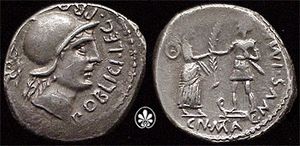Gnaeus Pompeius Magnus (son of Pompey) facts for kids
Quick facts for kids Gnaeus Pompeius Magnus |
|
|---|---|

Denarius of Gnaeus Pompeius Magnus the Younger, 46-45 BC
|
|
| Personal details | |
| Born | c. 75 BC |
| Died | 12 April 45 BC (aged 30) Lauro, Hispania Ulterior |
| Cause of death | Killed in battle |
| Nationality | Roman |
| Relations | Pompeia gens |
| Parents | Pompey Magnus and Mucia Tertia |
| Military service | |
| Allegiance | Pompey |
| Rank | Legatus |
| Battles/wars |
|
Gnaeus Pompeius Magnus (born around 75 BC – died April 12, 45 BC) was a Roman politician and general. He lived during the end of the Roman Republic, a time when Rome was ruled by elected officials and powerful leaders. Gnaeus was the older son of Pompey the Great, a very famous Roman general.
Contents
Who Was Gnaeus Pompeius Magnus?
Gnaeus Pompeius Magnus was the elder son of Pompey the Great and his third wife, Mucia Tertia. Both Gnaeus and his younger brother, Sextus Pompey, grew up in the shadow of their famous father. Pompey the Great was one of Rome's best generals.
The Start of the Civil War
In 49 BC, a major civil war began in Rome. This happened when Julius Caesar crossed the Rubicon river with his army, which was against Roman law. Gnaeus and his father, Pompey, fled to the East, as did many of the traditional Roman senators.
Pompey's army lost a big battle called the Battle of Pharsalus in 48 BC. After this defeat, Pompey had to run for his life. Sadly, he was murdered in Egypt on September 29 of the same year.
Continuing the Fight Against Caesar
After his father's death, Gnaeus and his brother Sextus joined other Roman leaders who were still fighting against Caesar. They gathered in the Africa Province to continue the resistance. Among them were Metellus Scipio and Cato.
Cato, a respected senator, told Gnaeus that his father had achieved much more by his age. This encouraged Gnaeus to try a solo attack in Mauretania, but he was defeated at the Battle of Ascurum.
Moving to Hispania
Later, Gnaeus and Sextus Pompey, along with Titus Labienus (a former general from Caesar's army), traveled to Hispania. This region is now modern Spain and Portugal. There, they managed to gather another large army to oppose Caesar.
The Battle of Munda
Caesar soon followed them to Hispania. On March 17, 45 BC, the armies of Caesar and the Pompey brothers met in the Battle of Munda. Both sides had many soldiers and skilled generals. The battle was very fierce and close.
However, a strong cavalry charge by Caesar's forces eventually turned the tide in his favor. During the battle and the panicked escape that followed, Titus Labienus and about 30,000 Pompeian soldiers died. Gnaeus and Sextus managed to escape once more.
Gnaeus's Final Days
After the Battle of Munda, it became clear that Caesar had won the civil war. Gnaeus and Sextus found it very difficult to find more supporters. Within a few weeks, Gnaeus Pompeius was cornered and killed by Lucius Caesennius Lento in a place called Lauro.
His younger brother, Sextus Pompeius, was able to avoid capture for another ten years. He created a powerful naval fleet and established a kind of independent kingdom in Sicily. He became so strong that he was recognized by the Second Triumvirate, a group of three powerful Roman leaders. However, Sextus was eventually defeated and executed by Augustus's general, Marcus Agrippa.
Family Life
Gnaeus Pompeius Magnus married a woman named Claudia. She survived him, but they did not have any children together.
See also
 In Spanish: Cneo Pompeyo el Joven para niños
In Spanish: Cneo Pompeyo el Joven para niños

